unit13marriage课文翻译综合教程四
Unit 13 Marriage Words and Expressions综合教程四
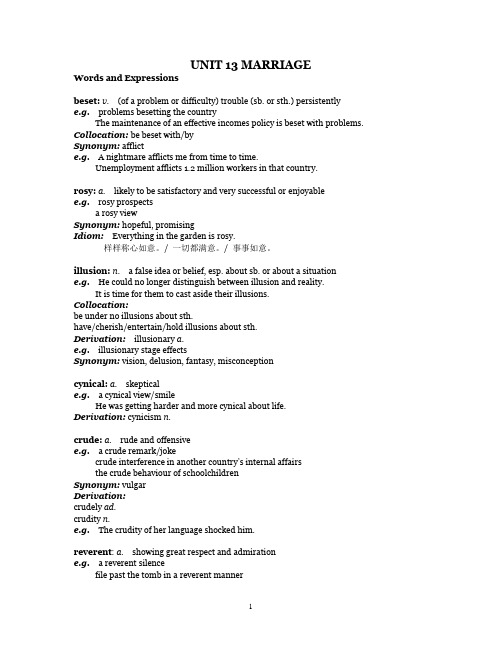
UNIT 13 MARRIAGEWords and Expressionsbeset:v.(of a problem or difficulty) trouble (sb. or sth.) persistentlye.g.problems besetting the countryThe maintenance of an effective incomes policy is beset with problems. Collocation:be beset with/bySynonym:afflicte.g. A nightmare afflicts me from time to time.Unemployment afflicts 1.2 million workers in that country.rosy:a.likely to be satisfactory and very successful or enjoyablee.g.rosy prospectsa rosy viewSynonym:hopeful, promisingIdiom:Everything in the garden is rosy.样样称心如意。
/ 一切都满意。
/ 事事如意。
illusion:n. a false idea or belief, esp. about sb. or about a situatione.g.He could no longer distinguish between illusion and reality.It is time for them to cast aside their illusions.Collocation:be under no illusions about sth.have/cherish/entertain/hold illusions about sth.Derivation:illusionary a.e.g.illusionary stage effectsSynonym: vision, delusion, fantasy, misconceptioncynical:a.skepticale.g. a cynical view/smileHe was getting harder and more cynical about life.Derivation:cynicism n.crude: a.rude and offensivee.g. a crude remark/jokecrude interference in another country’s internal affairsthe crude behaviour of schoolchildrenSynonym:vulgarDerivation:crudely ad.crudity n.e.g.The crudity of her language shocked him.reverent: a.showing great respect and admiratione.g. a reverent silencefile past the tomb in a reverent mannergive reverent attention to the sermonSynonym:respectful, adoringDerivation:reverently ad.reverence n.e.g.The crowd knelt in reverence and worshipped.The younger generation lack reverence.refrain:n.(in Paragraph 2) a regularly recurring phrase or verse, esp. at the end of each stanza or division of a poem or song; chorus vigorous and glowingv.(in Paragraph 4) stop oneself from doing sth., esp. sth. that one wants to do Collocation:refrain from (doing) sth.e.g.refrain from laughing/tearsHe has refrained from criticizing the government in public.green: a.young and lacking experiencee.g. a green handThe new trainees are still very green.Antonym: experienced, mature, versedtipsy:a.slightly drunke.g.The wine had made Barton a trifle tipsy.Synonym:tiddlyAntonym: soberrose-coloured:a. used in reference to a naively optimistic or idealistic viewpointe.g. a rose-coloured talk/plana rose-coloured vision of the worldSynonym:rose-tintedreputed:a.generally thought to be sth. or to have done sth., although this is not certain e.g. a man reputed to have worked miraclesHe is the reputed writer of the two epic poems.Synonym:supposedDerivation:reputedly ad.e.g.events that reputedly took place thousands of years agoReputedly, he is very dangerous.henpecked: a. dominated by one’s wifee.g. A henpecked husband always gives in to his wife.repent:v.feel regret or sorrow about one’s wrongdoing or sine.g.repent one’s crimes before a priestBitterly did we repent our decision.Collocation:repent of sth.; repent bitterly; come to repentDerivation:repentance n.e.g.He shows no sign of repentance.repentant a.e.g.She was not in the least repentant.caustic:a.critical in a bitter or sarcastic waye.g.caustic comments/wita caustic tongueSome caustic things have been written about media stars.Collocation:be caustic aboutSynonym: biting, acidscribble: v.write sth. quickly and untidilye.g. I scribbled his phone number in my address book.He scribbled down our names.Word formation:“scrib-” means “to write”e.g. describe, inscribe, prescribe, subscribe, transcribe, postscript, scripturedecoy:v.lure (a person or animal) away from their intended course, typically into a trap e.g.They decoyed him into a dark street.decoy sb. away from the houseSynonym:lure, enticee.g.The child was lured into a car but managed to escape.The bargain prices are expected to entice customers away from other stores. Collocation:decoy intopious: a.having or showing a deep respect for God and religione.g.pious acts/utterancesMrs. Smith was a very pious woman who attended church services regularly. Antonym:impious, profane, undutifulprolong: v. make sth. last longere.g.prolong a visitprolong one’s stay in LondonAll the time people are seeking to prolong life.The operation could prolong his life by two or three years.Synonym:lengthen, extendDerivation:prolongation n.prolonged a.motive: n. a reason for doing sth.e.g.be proper in motiveHe says that he is doing this to help me, but I suspect an ulterior motive. Collocation:motive for sth.ulterior motiveDerivation:motiveless a.e.g. an apparently motiveless murder/attackenviable:a.so desirable as to arouse envye.g.He is in the enviable position of having two job offers to choose from.She learned to speak foreign languages with enviable fluency.Synonym: admirableComparison:enviable & admirablee.g. He has earned himself an enviable position in the bank.Her dedication to her work was admirable.aesthete:n. a person who has a love and understanding of art and beautiful things e.g.Nobody will deny that Wilde is an outstanding aesthete.Derivation:aesthetic a.e.g.an aesthetic appreciation of the landscapeaesthetically ad.e.g.aesthetically pleasing colour combinationsaesthetics n.e.g.the relationship between aesthetics and translationimaginary:a.existing only in your mind or imaginatione.g.imaginary fears/threatsThe story is wholly imaginary.Comparison:imaginary & imaginableimaginary: hypothetical, existing only in one’s mind and not in real lifee.g.The equator is an imaginary line around the earth.imaginable: possible to imaginee.g.These technological developments were hardly imaginable 30 years ago. Blank filling:Even in the ____ danger, we should save the injured by every ____ means. Answer: imaginary, imaginable即使是在虚构的危险当中,我们也应该尽一切可能抢救伤员。
Unit 13 Marriage课文翻译综合教程四

Unit 13MarriageRobert Lynd1 “Conventional people,” says Mr. Bertrand Russell, “like to pretend thatdifficulties in regard to marriage are a new thing.” I could not help wondering, as I read this sentence, where one can meet these conventional people who think, or pretend to think, as conventional people do. I have known hundreds of conventional people, and I cannot remember one of them who thought the things conventional people seem to think. They were all, for example, convinced that marriage was a state beset with difficulties, and that these difficulties were as old, if not as the hills, at least as the day on which Adam lost a rib and gained a wife. A younger generation of conventional people has grown up in recent years, and it may be that they have a rosier conception of marriage than their ancestors; but the conventional people of the Victorian era were under no illusions on the subject. Their cynical attitude to marriage may be gathered from the enthusiastic reception they gave to Punch’s a dvice to those about to marry -“Don’t.”2 I doubt, indeed, whether the horrors of marriage were ever depicted morecruelly than during the conventional nineteenth century. The comic papers and music-halls made the miseries a standing dish. “You can always tell whethera man’s married or single from the way he’s dressed,” said the comedian.“Look at the single man: no buttons on his shirt. Look at the married man: no shirt.” The humour was crude; but it went home to the honest Victorian heart.If marriage were to be judged by the songs conventional people used to sing about it in the music-halls, it would seem a hell mainly populated by twins and leech-like mothers-in-law. The rare experiences of Darby and Joan were, it is true, occasionally hymned, reducing strong men smelling strongly of alcohol to reverent silence; but, on the whole, the audience felt more normal when a comedian came out with an anti-marital refrain such as:O why did I leave my little back roomIn Bloomsbury,Where I could live on a pound a weekIn luxury(I forget the next line).But since I have married Maria,I’ve jumped out of the frying-panInto the blooming fire.3 No difficulties Why, the very nigger-minstrels of my boyhood used to opentheir performance with a chorus which began:Married! Married! O pity those who’re married.Those who go and take a wife must be very green.4 It is possible that the comedians exaggerated, and that Victorian wives werenot all viragos with pokers, who beat their tipsy husbands for staying out too late. But at least they and their audiences refrained from painting marriage as an inevitable Paradise. Even the clergy would go no farther than to say that marriages were made in Heaven. That they did not believe that marriage necessarily ended there is shown by the fact that one of them wrote a “best-seller” bearing the title How to Be Happy Though Married.5 I doubt, indeed, whether common opinion in any age has ever looked onmarriage as an untroubled Paradise. I consulted a dictionary of quotations on the subject and discovered that few of the opinions quoted were rose-coloured.These opinions, it may be objected, are the opinions of unconventional people, but it is also true that they are opinions treasured and kept alive by conventional people. We have the reputed saying of the henpecked Socrates, for example, when asked whether it was better to marry or not: “Whichever you do, you will repent.” We have Montaigne writing: “It happens as one sees in cages.The birds outside despair of ever getting in; those inside are equally desirous of getting out.” Bacon is no more prenuptial with his caustic quotation: “He was reputed one of the wise men that made answer to the question when a man should marry: ‘A young man not yet; an elder man not at all.’” Burton is far from encouraging! “One was never married, and that’s his hell; another is, and that’s his plague.” Pepys scribbled in his diary: “Strange to say what delight we married people have to see these poor folk decoyed into our condition.”6 The pious Jeremy Taylor was as keenly aware that marriage is not all bliss.“Marriage,” he declared, “hath in it less of beauty and more of safety than the single life - it hath more care but less danger; it is more merry and more sad; it is fuller of sorrows and fuller of joys.” The sentimental and optimistic Steele can do no better than: “The marriage state, with and withoutthe affection suitable to it, is the completest image of Heaven and Hell we are capable of receiving in this life.”7 Rousseau denied that a perfect marriage had ever been known. “I have oftenthought,” he wrote, “that if only one could prolong the joy of love in marriage we should have paradise on earth. That is a thing which has never been hitherto.” Dr. Johnson is not quoted in the dictionary; but everyone will remember how, devoted husband though he was, he denied that the state of marriage was natural to man. “Sir,” he declared, “it is so far from being natural for a man and woman to live in a state of marriage that we find all the motives which they have for remaining in that connexion and the restraints which civilised society imposes to prevent separation are hardly sufficient to keep them together."8 When one reads the things that have been said about marriage from onegeneration to another, one cannot but be amazed at the courage with which the young go on marrying. Almost everybody, conventional and unconventional, seems to have painted the troubles of marriage in the darkest colours. So pessimistic were the conventional novelists of the nineteenth century about marriage that they seldom dared to prolong their stories beyond the wedding bells. Married people in plays and novels are seldom enviable, and, as time goes on, they seem to get more and more miserable. Even conventional people nowadays enjoy the story of a thoroughly unhappy marriage. It is only fair to say, however, that in modern times we like to imagine that nearly everybody, single as well as married, is unhappy. As social reformers we are all for happiness, but as thinkers and aesthetes we are on the side of misery.9 The truth is that we are a difficulty-conscious generation. Whether or notwe make life even more difficult than it would otherwise be by constantly talking about our difficulties I do not know. I sometimes suspect that half our difficulties are imaginary and that if we kept quiet about them they would disappear. Is it quite certain that the ostrich by burying his head in the sand never escapes his pursuers I look forward to the day when a great naturalist will discover that it is to this practice that the ostrich owes his survival.婚姻罗伯特·林德1 伯特兰·罗素先生说:“凡人百姓喜欢假装说婚姻中遇到的困难是新鲜事。
21世纪大学实用英语综合教程(第四册)课后翻译
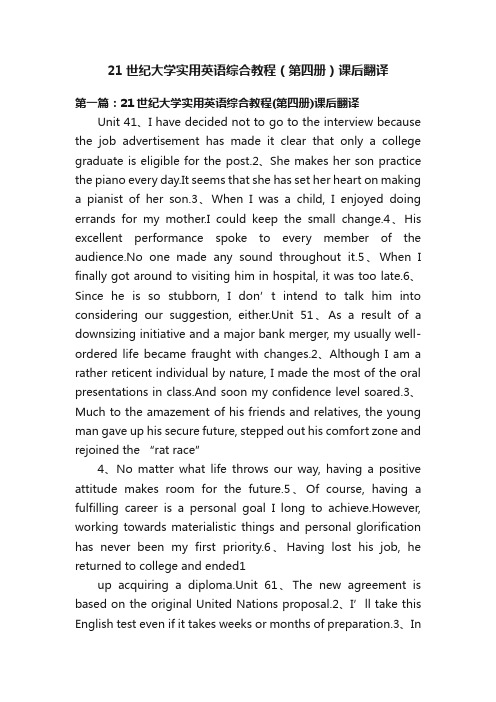
21世纪大学实用英语综合教程(第四册)课后翻译第一篇:21世纪大学实用英语综合教程(第四册)课后翻译Unit 41、I have decided not to go to the interview because the job advertisement has made it clear that only a college graduate is eligible for the post.2、She makes her son practice the piano every day.It seems that she has set her heart on making a pianist of her son.3、When I was a child, I enjoyed doing errands for my mother.I could keep the small change.4、His excellent performance spoke to every member of the audience.No one made any sound throughout it.5、When I finally got around to visiting him in hospital, it was too late.6、Since he is so stubborn, I don’t intend to talk him into considering our suggestion, either.Unit 51、As a result of a downsizing initiative and a major bank merger, my usually well-ordered life became fraught with changes.2、Although I am a rather reticent individual by nature, I made the most of the oral presentations in class.And soon my confidence level soared.3、Much to the amazement of his friends and relatives, the young man gave up his secure future, stepped out his comfort zone and rejoined the “rat race”4、No matter what life throws our way, having a positive attitude makes room for the future.5、Of course, having a fulfilling career is a personal goal I long to achieve.However, working towards materialistic things and personal glorification has never been my first priority.6、Having lost his job, he returned to college and ended1up acquiring a diploma.Unit 61、The new agreement is based on the original United Nations proposal.2、I’ll take this English test even if it takes weeks or months of preparation.3、Inorder to sell anybody anything in five minutes or less, you have to find common ground on which you and your client can stand together.4、Yes, you must work harder in your studies.But it does not mean that you have to sacrifice your health for better grades.5、We’re not here to talk about what divides us.We’re here to find the things that bind us together.6、In some cases you have to stoop to conquer.But does it mean that you have to sacrifice your integrity? Certainly not.Unit 71、While attending Columbia, Liming became good friends with Wang Ying, a twenty-year-old girl from Hong Kong.Encouraged by his instruc tor, John decided to make medicine his life’s career.2、Less than a month after he came to McGill University, Dr.Johnson submitted to the president a detailed plan for setting up a new laboratory in the biology department.3、After receiving the urgent cablegram from his former instructor, Dr.Drew immediately set to work and organized the “Blood for Britain” campaign.4、At the beginning of the following year, thousands of American soldiers were killed or injured on the battlefield.5、In a series of experiments, Dr.Drew discovered that plasma could be given to any patient regardless of blood type.第二篇:大学英语综合教程第四册 uint1 课文翻译上帝显灵罗布·博尔医生正渴望吃上一顿热乎乎的火鸡晚餐和苹果馅饼。
Unit 13 Marriage课文翻译综合教程四
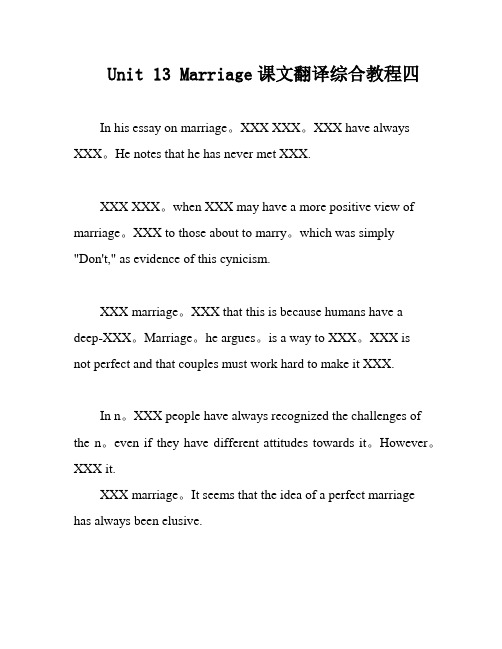
Unit 13 Marriage课文翻译综合教程四In his essay on marriage。
XXX XXX。
XXX have always XXX。
He notes that he has never met XXX.XXX XXX。
when XXX may have a more positive view of marriage。
XXX to those about to marry。
which was simply "Don't," as evidence of this cynicism.XXX marriage。
XXX that this is because humans have a deep-XXX。
Marriage。
he argues。
is a way to XXX。
XXX isnot perfect and that couples must work hard to make it XXX.In n。
XXX people have always recognized the challenges of the n。
even if they have different attitudes towards it。
However。
XXX it.XXX marriage。
It seems that the idea of a perfect marriage has always been elusive.As for my own experience。
I can say that I have gone from one difficult XXX。
sung by minstrels。
which mocked the idea of marriage and warned of its difficulties。
While it is possible that these performers exaggerated。
综合英语第四册Unit 13 Marriage教案
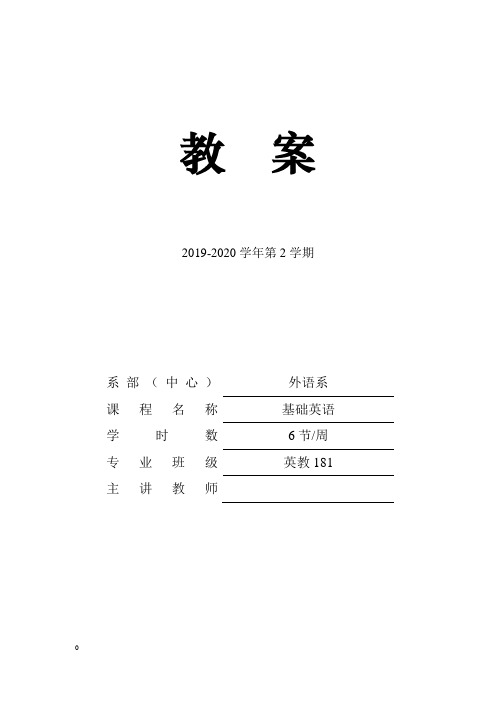
教案
2019-2020学年第2学期
系部(中心)外语系课程名称基础英语学时数6节/周专业班级英教181 主讲教师
教案
编号:13
参考书目:
[1] 胡文仲、祝钰、马元曦、李贺.《大学英语》.北京:外语教学与研究出版社,1997
[2] L.G. Alexander, He Qishen. New Concept English.北京:外语教学与研究出版
社,1997
[3] 胡文仲、祝钰、马元曦、李贺.《大学英语教程》(Book I.II).北京:外语教学与研究出版社,2001
[4] 王佐良、祝珏、李品伟、高厚主编.《欧洲文化入门》.北京:外语教学与研究出版社,2004
[5] 黄源深,虞苏美等主编.《综合英语教程》(1-4册).北京:高等教育出版社,1998
[6] 杨立民主编.《现代大学英语》.北京:外语教学研究出版社,2001
[7] 李观仪主编.《新编英语教程》.上海:上海外语教育出版社,1999
[8] 高等学校外语专业教学指导委员会英语组编.《高等学校英语专业英语教学大纲》. 北京:外语教学研究出版社,2000
[9] Jack C. Richards.《剑桥国际英语教程》.北京:外语教学研究出版社,2000
[10] 《朗文当代英语词典》.北京:外语教学研究出版社,1995
[11] 《柯林斯高阶英语学习词典》.北京:中国对外翻译出版公司,2001。
(完整版)Unit 13 Marriage课文翻译综合教程四
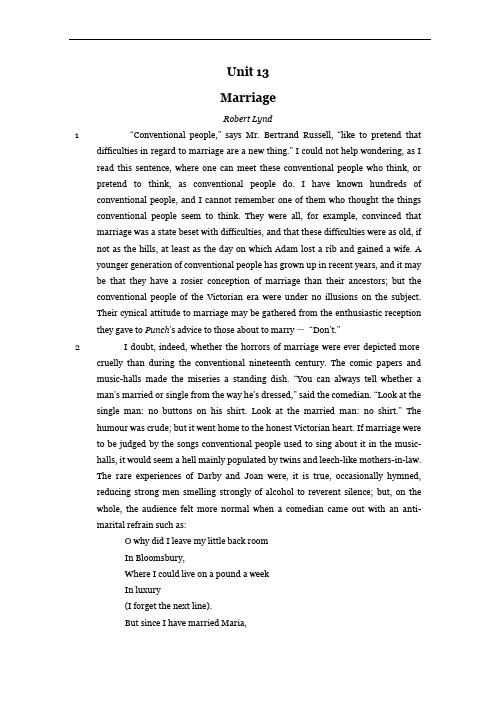
Unit 13MarriageRobert Lynd1“Conventional people,” says Mr. Bertrand Russell, “like to pretend that difficulties in regard to marriage are a new thing.” I could not help wondering, as I read this sentence, where one can meet these conventional people who think, or pretend to think, as conventional people do. I have known hundreds of conventional people, and I cannot remember one of them who thought the things conventional people seem to think. They were all, for example, convinced that marriage was a state beset with difficulties, and that these difficulties were as old, if not as the hills, at least as the day on which Adam lost a rib and gained a wife. A younger generation of conventional people has grown up in recent years, and it may be that they have a rosier conception of marriage than their ancestors; but the conventional people of the Victorian era were under no illusions on the subject.Their cynical attitude to marriage may be gathered from the enthusiastic reception they gave to Punch’s advice to those about to marry -“Don’t.”2I doubt, indeed, whether the horrors of marriage were ever depicted more cruelly than during the conventional nineteenth century. The comic papers and music-halls made the miseries a standing dish. “You can always tell whether a man’s married or single from the way he’s dressed,” said the comedian. “Look at the single man: no buttons on his shirt. Look at the married man: no shirt.” The humour was crude; but it went home to the honest Victorian heart. If marriage were to be judged by the songs conventional people used to sing about it in the music- halls, it would seem a hell mainly populated by twins and leech-like mothers-in-law.The rare experiences of Darby and Joan were, it is true, occasionally hymned, reducing strong men smelling strongly of alcohol to reverent silence; but, on the whole, the audience felt more normal when a comedian came out with an anti- marital refrain such as:O why did I leave my little back roomIn Bloomsbury,Where I could live on a pound a weekIn luxury(I forget the next line).But since I have married Maria,I’ve jumped out of the frying-panInto the blooming fire.3No difficulties? Why, the very nigger-minstrels of my boyhood used to open their performance with a chorus which began:Married! Married! O pity those who’re married.Those who go and take a wife must be very green.4It is possible that the comedians exaggerated, and that Victorian wives were not all viragos with pokers, who beat their tipsy husbands for staying out too late. But at least they and their audiences refrained from painting marriage as an inevitable Paradise. Even the clergy would go no farther than to say that marriages were made in Heaven. That they did not believe that marriage necessarily ended there is shown by the fact that one of them wrote a “best-seller” bearing the title How to Be Happy Though Married.5I doubt, indeed, whether common opinion in any age has ever looked on marriage as an untroubled Paradise. I consulted a dictionary of quotations on the subject and discovered that few of the opinions quoted were rose-coloured. These opinions, it may be objected, are the opinions of unconventional people, but it is also true that they are opinions treasured and kept alive by conventional people. We have the reputed saying of the henpecked Socrates, for example, when asked whether it was better to marry or no t: “Whichever you do, you will repent.” We have Montaigne writing: “It happens as one sees in cages. The birds outside despair of ever getting in; those inside are equally desirous of getting out.” Bacon is no more prenuptial with his caustic quotation: “H e was reputed one of the wise men that made answer to the question when a man should marry: ‘A young man not yet; an elder man not at all.’” Burton is far from encouraging! “One was never married, and that’s his hell; another is, and that’s his plague.” Pe pys scribbled in his diary: “Strange to say what delight we married people have to see these poor folk decoyed into our condition.”6The pious Jeremy Taylor was as keenly aware that marriage is not all bliss.“Marriage,” he declared, “hath in it less of be auty and more of safety than the single life -it hath more care but less danger; it is more merry and more sad; it is fuller of sorrows and fuller of joys.” The sentimental and optimistic Steele can do no better than: “The marriage state, with and without the affection suitable to it, is the completest image of Heaven and Hell we are capable of receiving in this life.”7Rousseau denied that a perfect marriage had ever been known. “I have oftenthought,” he wrote, “that if only one could prolong the joy of love in marriage we should have paradise on earth. That is a thing which has never been hitherto.” Dr.Johnson is not quoted in the dictionary; but everyone will remember how, devoted husband though he was, he denied that the state of marriage was natural to man.“Sir,” he declared, “it is so far from being natural for a man and woman to live in a state of marriage that we find all the motives which they have for remaining in that connexion and the restraints which civilised society imposes to prevent separation are hardly sufficient to keep them together."8When one reads the things that have been said about marriage from one generation to another, one cannot but be amazed at the courage with which the young go on marrying. Almost everybody, conventional and unconventional, seems to have painted the troubles of marriage in the darkest colours. So pessimistic were the conventional novelists of the nineteenth century about marriage that they seldom dared to prolong their stories beyond the wedding bells. Married people in plays and novels are seldom enviable, and, as time goes on, they seem to get more and more miserable. Even conventional people nowadays enjoy the story of a thoroughly unhappy marriage. It is only fair to say, however, that in modern times we like to imagine that nearly everybody, single as well as married, is unhappy. As social reformers we are all for happiness, but as thinkers and aesthetes we are on the side of misery.9The truth is that we are a difficulty-conscious generation. Whether or not we make life even more difficult than it would otherwise be by constantly talking about our difficulties I do not know. I sometimes suspect that half our difficulties are imaginary and that if we kept quiet about them they would disappear. Is it quite certain that the ostrich by burying his head in the sand never escapes his pursuers?I look forward to the day when a great naturalist will discover that it is to thispractice that the ostrich owes his survival.婚姻罗伯特·林德1伯特兰·罗素先生说:“凡人百姓喜欢假装说婚姻中遇到的困难是新鲜事。
21世纪大学实用英语综合教程(第四册)课后翻译答案(Unit1-4)
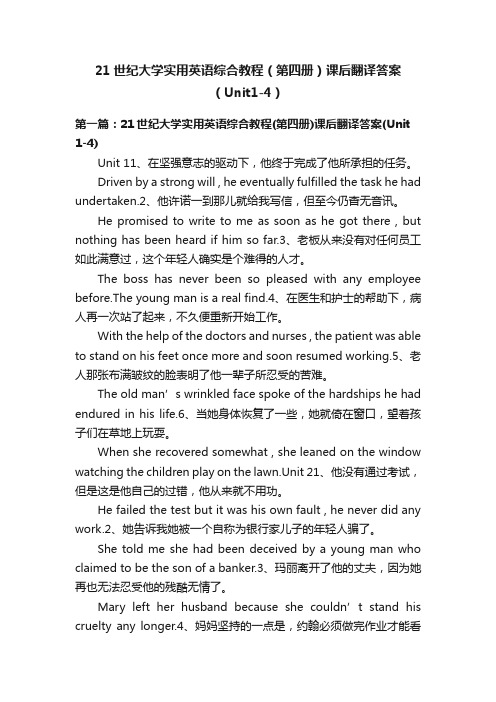
21世纪大学实用英语综合教程(第四册)课后翻译答案(Unit1-4)第一篇:21世纪大学实用英语综合教程(第四册)课后翻译答案(Unit 1-4)Unit 11、在坚强意志的驱动下,他终于完成了他所承担的任务。
Driven by a strong will , he eventually fulfilled the task he had undertaken.2、他许诺一到那儿就给我写信,但至今仍杳无音讯。
He promised to write to me as soon as he got there , but nothing has been heard if him so far.3、老板从来没有对任何员工如此满意过,这个年轻人确实是个难得的人才。
The boss has never been so pleased with any employee before.The young man is a real find.4、在医生和护士的帮助下,病人再一次站了起来,不久便重新开始工作。
With the help of the doctors and nurses , the patient was able to stand on his feet once more and soon resumed working.5、老人那张布满皱纹的脸表明了他一辈子所忍受的苦难。
The old man’s wrinkled face spoke of the hardships he had endured in his life.6、当她身体恢复了一些,她就倚在窗口,望着孩子们在草地上玩耍。
When she recovered somewhat , she leaned on the window watching the children play on the lawn.Unit 21、他没有通过考试,但是这是他自己的过错,他从来就不用功。
何兆熊《综合教程(4)》(第2版)学习指南【词汇短语+课文精解+全文翻译+练习答案】(Unit 13

何兆熊《综合教程(4)》(第2版)学习指南【词汇短语+课文精解+全文翻译+练习答案】Unit13一、词汇短语Text I1.rib[]n.12pairs of curved bones that surround your chest.肋骨:The Goddecided to create“woman”,and he should take a rib from Adam.上帝决定创造“女人”,但他须要从亚当那得到一支肋骨。
2.rosy[]adj.have pink cheeks and look very healthy(面色)红润的:The old woman’s rosy face made her seem hardly to have aged at all.这位老妇人那红润的脸使她看上去几乎一点儿也没有变老。
3.cynical[]adj.do not believe that sth.can be successful or thatthe people involved are honest(对事情的成功或人的诚信)怀疑的:It’s hardfor him not to be cynical about reform.对他来说,很难对改革不持怀疑态度。
4.leech-like[]adj.as persistent as a blood-sucking worm似水蛭的,像水蛭的5.hymn[]v.sing a song of praise唱赞美诗6.reverent[]adj.showing great reverence for god恭敬的,虔诚的:The little girl is singing the hymn with reverent expression.这个小女孩带着虔诚的神情唱着赞美诗。
7.refrain[]n.a short,simple part of a song,which is repeated many times副歌8.nigger-minstrel[]n.any of a troupe ofperformers typically giving a program of black American melodies,jokes,and impersonations and usu.Wearing blackface黑人歌手9.virago[]n.a noisy or scolding or domineering woman泼妇,悍妇,有男子气概的女子10.poker[]n.a metal bar that is used to move coal or wood in a stoveor fireplace in order to make it burn better拨火棍11.tipsy[]adj.slightly drunk微醉的:I was tipsy this afternoon,but nowam sober.我今天下午有些醉意,但现在是清醒的。
Unit 13 Marriage习题答案综合教程四
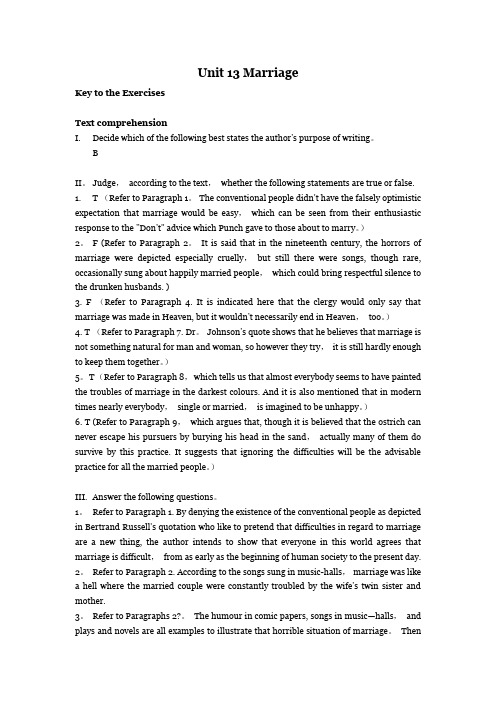
Unit 13 MarriageKey to the ExercisesText comprehensionI. Decide which of the following best states the author’s purpose of writing。
BII。
Judge,according to the text,whether the following statements are true or false.1. T (Refer to Paragraph 1。
The conventional people didn't have the falsely optimistic expectation that marriage would be easy,which can be seen from their enthusiastic response to the ”Don’t" advice which Punch gave to those about to marry。
)2。
F (Refer to Paragraph 2。
It is said that in the nineteenth century, the horrors of marriage were depicted especially cruelly,but still there were songs, though rare, occasionally sung about happily married people,which could bring respectful silence to the drunken husbands. )3. F (Refer to Paragraph4. It is indicated here that the clergy would only say that marriage was made in Heaven, but it wouldn’t necessarily end in Heaven,too。
marriage 大学英语四级 翻译和写作
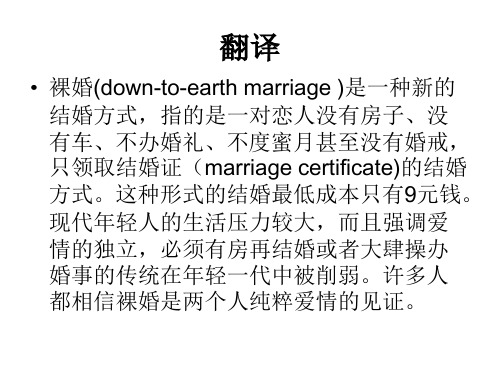
Marriage: Is it Still a Tradition? 要求: 1.剩男剩女( leftover women and men)越来越 多; 2.传统的成家立业 (marry and settle down)结 婚思想是否会发生变化? 3.未来社会是否会有更多的人选择不结婚, 单身过日子,谈谈你的看法。
翻译
• 裸婚(down-to-earth marriage )是一种新的 结婚方式,指的是一对恋人没有房子、没 有车、不办婚礼、不度蜜月甚至没有婚戒, 只领取结婚证(marriage certificate)的结婚 方式。这种形式的结婚最低成本只有9元钱。 现代年轻人的生活压力较大,而且强调爱 情的独立,必须有房再结婚或者大肆操办 婚事的传统在年轻一代中被削弱。许多人 都相信裸婚是两个人纯粹爱情的见证。
Down-to-earth Marriage
• As a new way of getting married, down-to-earth marriage means that a couple marries each other by only applying for a marriage certificate without an apartment, a car, a wedding ceremony, a honeymoon, or even a wedding ring. This form of marriage can cost as little as only nine yuan. As young people in modern times live under great pressure and place emphasis on the independence of love, the tradition that “an apartment is a must for marriage” and “wedding ceremony should be held on a grand scale” has weakened among the young generation. Many people believe that a down-to-earth marriage is a testament to the pure love between the couple.
UnitMarriage习题答案综合教程四

UnitMarriage习题答案综合教程四UnitMarriage 习题答案综合教程四Document number [980KGB-6898YT-769T8CB-246UT-18GG08]that marriage is difficult, from as early as the beginning of human society to the present day.2.Refer to Paragraph 2. According to the songs sung in music- halls, marriage was likea hell where the married couple were constantly troubled by the wife's twin sister and mother.3.Refer to Paragraphs 2?. The humour in comic papers, songs in music-halls, and plays and novels are all examples to illustrate that horrible situation of marriage. Then quotations of reputed philosophers, writers, scientists and essayists are used to prove that even the wise painted marriage in the darkest colours.4.Refer to Paragraphs 5?. By z unconvent ional people, " the author refers to philosophers, writers and scientists, who have knowledge, talents and wisdom. What they thought of marriage could be derived from the essence of human experience.5.Refer to Paragraph 8. Since social reformers are keen to maintain the positive development of society, of which marriage and family are the most important building stones, they try to convince people to pursue happiness in marriage by recommending changes in their lives; while thinkers and seekers of beauty are more realistic about the chances of achieving what one desires, and they explore the essence of life through meditating over its miseries and difficulties.6.Refer to Paragraph 9. The ostrich, when pursued, hides its headin the sand and believes itself to be unseen. The logic in the ostrich's practice is that one can avoid danger or difficulty by refusing to face it. The author hopes that someday a naturalist will find out the ostrich's logic is valid, so that people can follow this practice by ignoring the difficulties in marriage, or pretending that they never exist. The metaphor is used to propose that, to a difficulty-conscious generation who are too thought of difficulty, it will be advisable existence. Otherwise, they will never enjoy If marriage is really both Heaven and Hell, Heaven because of his fear of Hell.IV. Explain in your own words the following sentences.1.From the way they enthusiastically received the "Don't" advice given in the magazine Punch, we can tell that they adopted a sceptical attitude to marriage. much burdened with the to pretend in its non- the rosy side of marriage, one will never be inhumor might sound offensively rude, it was readily in the Victorian era. state, whether there is happiness and misery we Structural analysis of the textThe text falls into three parts : in Part 1 after quoting Russell on the subject, puts that difficulties in regard to marriage have been an old issue for centuries. In Part 2 (Paragraphs 2?), the author analyzes the roots of such difficulties by listing quotations from famous literary works and famous people. In Part 3 (Paragraphs 8?), the author assigns the causes of unhappy marriages to the excessive consciousness of difficulties in human beings, and encourages people to face the difficulties in marriage bravely.Rhetorical features of the text1& he reputed saying of the henpecked Socrates, Burton isfar from encouraging! Pepys scribbled in his diary ?The pious Jeremy Taylor was as keenly aware that marriage is not all bliss.The sentimental and optimistic Steele ?Dr. Johnson, ?devoted husband though he was, ? Vocabulary exercisesI.Explain the underlined part in each sentence in your own words. 1.inexperienced; unsophisticated; immature 2.troubled 3. welcome; response4. rude: harsh5. calamity; disaster6. lengthen in durationII. Fill in the blank in each sentence with a word or phrase fromthe box in its appropriate form.1. standing2. make answer to3. under no illusions4. In regard to5. beset6. went home to his heart 2.Although the accepted by people 3. The marriage combination of thelove involved or not, is a mayencounter in life. (Paragraph 1), the author, forward his own argument。
UnitMarriage习题答案综合教程四

UnitMarriage 习题答案综合教程四Document number [980KGB-6898YT-769T8CB-246UT-18GG08]that marriage is difficult, from as early as the beginning of human society to the present day.2.Refer to Paragraph 2. According to the songs sung in music- halls, marriage was likea hell where the married couple were constantly troubled by the wife's twin sister and mother.3.Refer to Paragraphs 2?. The humour in comic papers, songs in music-halls, and plays and novels are all examples to illustrate that horrible situation of marriage. Then quotations of reputed philosophers, writers, scientists and essayists are used to prove that even the wise painted marriage in the darkest colours.4.Refer to Paragraphs 5?. By z unconvent ional people, " the author refers to philosophers, writers and scientists, who have knowledge, talents and wisdom. What they thought of marriage could be derived from the essence of human experience.5.Refer to Paragraph 8. Since social reformers are keen to maintain the positive development of society, of which marriage and family are the most important building stones, they try to convince people to pursue happiness in marriage by recommending changes in their lives; while thinkers and seekers of beauty are more realistic about the chances of achieving what one desires, and they explore the essence of life through meditating over its miseries and difficulties.6.Refer to Paragraph 9. The ostrich, when pursued, hides its headin the sand and believes itself to be unseen. The logic in the ostrich's practice is that one can avoid danger or difficulty by refusing to face it. The author hopes that someday a naturalist will find out the ostrich's logic is valid, so that people can follow this practice by ignoring the difficulties in marriage, or pretending that they never exist. The metaphor is used to propose that, to a difficulty-conscious generation who are too thought of difficulty, it will be advisable existence. Otherwise, they will never enjoy If marriage is really both Heaven andHell, Heaven because of his fear of Hell.IV. Explain in your own words the following sentences.1.From the way they enthusiastically received the "Don't" advice given in the magazine Punch, we can tell that they adopted a sceptical attitude to marriage. much burdened with the to pretend in its non- the rosy side of marriage, one will never be inhumor might sound offensively rude, it was readily in the Victorian era. state, whether there is happiness and misery we Structural analysis of the textThe text falls into three parts : in Part 1 after quoting Russell on the subject, puts that difficulties in regard to marriage have been an old issue for centuries. In Part 2 (Paragraphs 2?), the author analyzes the roots of such difficulties by listing quotations from famous literary works and famous people. In Part 3 (Paragraphs 8?), the author assigns the causes of unhappy marriages to the excessive consciousness of difficulties in human beings, and encourages people to face the difficulties in marriage bravely.Rhetorical features of the text1& he reputed saying of the henpecked Socrates, Burton is far from encouraging! Pepys scribbled in his diary ?The pious Jeremy Taylor was as keenly aware that marriage is not all bliss.The sentimental and optimistic Steele ?Dr. Johnson, ?devoted husband though he was, ? Vocabulary exercisesI.Explain the underlined part in each sentence in your own words. 1.inexperienced; unsophisticated; immature 2.troubled 3. welcome; response4. rude: harsh5. calamity; disaster6. lengthen in durationII. Fill in the blank in each sentence with a word or phrase fromthe box in its appropriate form.1. standing2. make answer to3. under no illusions4. In regard to5. beset6. went home to his heart 2.Although the accepted by people 3. The marriage combination of thelove involved or not, is a mayencounter in life. (Paragraph 1), the author, forward his own argument。
Unit 13 Marriage课文翻译综合教程四
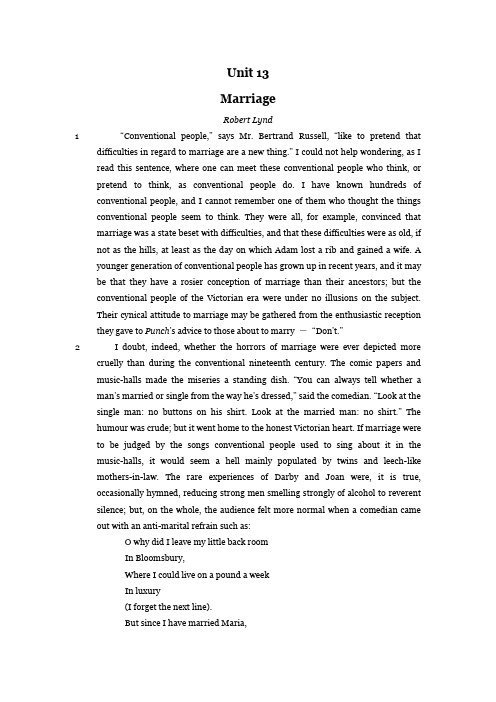
Unit 13MarriageRobert Lynd1 “Conventional people,” says Mr. Bertrand Russell, “like to pretend thatdifficulties in regard to marriage are a new thing.” I could not help wondering, as I read this sentence, where one can meet these conventional people who think, or pretend to think, as conventional people do. I have known hundreds of conventional people, and I cannot remember one of them who thought the things conventional people seem to think. They were all, for example, convinced that marriage was a state beset with difficulties, and that these difficulties were as old, if not as the hills, at least as the day on which Adam lost a rib and gained a wife. A younger generation of conventional people has grown up in recent years, and it may be that they have a rosier conception of marriage than their ancestors; but the conventional people of the Victorian era were under no illusions on the subject.Their cynical attitude to marriage may be gathered from the enthusiastic reception they gave to Punch’s a dvice to those about to marry -“Don’t.”2 I doubt, indeed, whether the horrors of marriage were ever depicted morecruelly than during the conventional nineteenth century. The comic papers and music-halls made the miseries a standing dish. “You can always tell whether a man’s married or single from the way he’s dressed,” said the comedian. “Look at the single man: no buttons on his shirt. Look at the married man: no shirt.” The humour was crude; but it went home to the honest Victorian heart. If marriage were to be judged by the songs conventional people used to sing about it in the music-halls, it would seem a hell mainly populated by twins and leech-like mothers-in-law. The rare experiences of Darby and Joan were, it is true, occasionally hymned, reducing strong men smelling strongly of alcohol to reverent silence; but, on the whole, the audience felt more normal when a comedian came out with an anti-marital refrain such as:O why did I leave my little back roomIn Bloomsbury,Where I could live on a pound a weekIn luxury(I forget the next line).But since I have married Maria,I’ve jumped out of the frying-panInto the blooming fire.3 No difficulties? Why, the very nigger-minstrels of my boyhood used to opentheir performance with a chorus which began:Married! Married! O pity those who’re married.Those who go and take a wife must be very green.4 It is possible that the comedians exaggerated, and that Victorian wives were notall viragos with pokers, who beat their tipsy husbands for staying out too late. But at least they and their audiences refrained from painting marriage as an inevitable Paradise. Even the clergy would go no farther than to say that marriages were made in Heaven. That they did not believe that marriage necessarily ended there is shown by the fact that one of them wrote a “best-seller” bearing the title How to Be Happy Though Married.5 I doubt, indeed, whether common opinion in any age has ever looked onmarriage as an untroubled Paradise. I consulted a dictionary of quotations on the subject and discovered that few of the opinions quoted were rose-coloured. These opinions, it may be objected, are the opinions of unconventional people, but it is also true that they are opinions treasured and kept alive by conventional people. We have the reputed saying of the henpecked Socrates, for example, when asked whether it was better to marry or not: “Whichever you do, you will repent.” We have Montaigne writing: “It happens as one sees in cages. The birds outside despair of ever getting in; those inside are equally desirous of getting out.” Bacon is no more prenuptial with his caustic quotation: “He was reputed one of the wise men that made answer to the question when a man should marry: ‘A young man not ye t; an elder man not at all.’” Burton is far from encouraging! “One was never married, and that’s his hell; another is, and that’s his plague.” Pepys scribbled in his diary: “Strange to say what delight we married people have to see these poor folk decoyed into our condition.”6 The pious Jeremy Taylor was as keenly aware that marriage is not all bliss.“Marriage,” he declared, “hath in it less of beauty and more of safety than the single life -it hath more care but less danger; it is more merry and more sad; it is fuller of sorrows and fuller of joys.” The sentimental and optimistic Steele can do no better than: “The marriage state, with and without the affection suitable to it, is the complet est image of Heaven and Hell we are capable of receiving in this life.”7 Rousseau denied that a perfect marriage had ever been known. “I have oftenthought,” he wrote, “that if only one could prolong the joy of love in marriage we should have parad ise on earth. That is a thing which has never been hitherto.” Dr.Johnson is not quoted in the dictionary; but everyone will remember how, devoted husband though he was, he denied that the state of marriage was natural to man.“Sir,” he declared, “it is so far from being natural for a man and woman to live in a state of marriage that we find all the motives which they have for remaining in that connexion and the restraints which civilised society imposes to prevent separation are hardly sufficient to keep them together."8 When one reads the things that have been said about marriage from onegeneration to another, one cannot but be amazed at the courage with which the young go on marrying. Almost everybody, conventional and unconventional, seems to have painted the troubles of marriage in the darkest colours. So pessimistic were the conventional novelists of the nineteenth century about marriage that they seldom dared to prolong their stories beyond the wedding bells. Married people in plays and novels are seldom enviable, and, as time goes on, they seem to get more and more miserable. Even conventional people nowadays enjoy the story of a thoroughly unhappy marriage. It is only fair to say, however, that in modern times we like to imagine that nearly everybody, single as well as married, is unhappy. As social reformers we are all for happiness, but as thinkers and aesthetes we are on the side of misery.9 The truth is that we are a difficulty-conscious generation. Whether or not wemake life even more difficult than it would otherwise be by constantly talking about our difficulties I do not know. I sometimes suspect that half our difficulties are imaginary and that if we kept quiet about them they would disappear. Is it quite certain that the ostrich by burying his head in the sand never escapes his pursuers?I look forward to the day when a great naturalist will discover that it is to thispractice that the ostrich owes his survival.婚姻罗伯特·林德1 伯特兰·罗素先生说:“凡人百姓喜欢假装说婚姻中遇到的困难是新鲜事。
【9A文】研究生英语读写译教程-Marriage原文翻译及课后答案

婚姻何以失败安·洛芙[1]如今,以离婚告终的婚姻如此之多,我们最神圣的誓约听上去都不再真实了。
“从此永远幸福地生活着”和“直到死神将我们分开”这类话语似乎快过时了。
夫妻长相守何以变得如此困难?哪儿出了问题?我们到底怎么了,竟然有差不多半数的婚姻注定要以离婚法庭为终点?有42%的儿童将在单亲家庭中长大,我们怎么把社会弄成这样了呢?如果统计数字能测量出孤独、懊悔、痛苦、失去自信和对未来恐惧的程度,这些数字会大得惊人。
[2]虽然破裂的婚姻各有其独特的情况,但我们还是能找到致使婚姻无法维持下去的共同因素,即常见的危险。
凡婚姻都有其危机时刻,都要考验持久力、考验既能亲密相处又善应对变化的能力。
外部压力,如失业、疾病、不育、抚育孩子、赡养年迈的父母,以及生活中其他种种烦恼,都会如飓风横扫海岸那样对婚姻带来打击。
有些婚姻经受住了这些风暴,有些则不然。
但婚姻失败并不是简单地由外部天气造成的,而是由于内部气候变得过热或过冷,变得过于狂暴或过于麻木造成的。
[3]如果我们来看一下自己如何挑选配偶,看一下在爱情最初的温柔、浪漫阶段有着怎样的期待,婚姻触礁的一些原因便显而易见了。
无意中我们都精确地选中了能和我们一起重建我们第一个家庭的情感模式的伴侣。
婚姻心理治疗专家、威斯康星大学精神病学荣誉退职教授卡尔·A·威塔科尔解释说:“从幼年起,我们每一个人心里就对婚姻、女性气质、男性气质、为人母、为人父,以及其他各种家庭角色有了自己的模式。
”我们每一个人都爱上具有自己父母气质的伴侣,能帮助我们在心理上重温以往生活中的欢乐与苦难的伴侣。
我们或许会以为自己找的男人与爸爸不同,可是到头来,就像爸爸那样,他酗酒,或者吸毒,或者一次又一次失业,或者就像爸爸那样一言不发地坐在电视机前。
男人或许会选择一个像自己母亲一样不喜欢孩子的女人,或者一个像自己母亲一样把家里的钱全都赌光的女人。
或者他会选择一个苗条的妻子,与体态臃肿的母亲看上去似乎不一样,可结果发现那女子有其他的嗜好,这就毁了双方的幸福。
综合英语教程第四册 第13单元

Brainstorming
4. Expressions of similarities: --n. similarity, affinity, analogy, comparability, closeness , resemblance, likeness, equivalence, parallel, uniformity (in) --v. match, look like, be alike, resemble --adj. similar, identical, equal, comparable, indistinguishable, same, equivalent The French and Italian languages have many affinities with each other. There are some interesting parallels between the author and the hero of the novel.
Do you often daydream? Exchange your daydreams with your group members What are the benefit and dangers of having a rich fantasy life? Have you thought carefully about your past and your future? Do you think this kind of thinking is necessary in life? What would you do if the reality fails to meet fantasy?
Inner and Outer Worlds
Unit 13 Marriage 综合教程四

Audiovisual supplement
Cultural background
3) The way they spend their time together Of course, you and your spouse have individual needs and interests. However, you and your spouse should focus on the time you spend together, instead of the activity itself.
Audiovisual supplement
Cultural background
2. Stuttered speech
1) Money Money is a sensitive area and your household finances need to be properly structured. You and your spouse should define your core values. Try to come to an understanding about what you both care the most about spending money on.
General analysis
Structural analysis
Rhetorical features
In this text the author often makes comments on the people he quotes or what is said by those people so as to express his own opinions. Listed below are the comments made by the author in Paragraphs 5 - 7: … the reputed saying of the henpecked Socrates, ... . (Paragraph 5) Burton is far from encouraging! (Paragraph 5) Pepys scribbled in his diary ... (Paragraph 5) The pious Jeremy Taylor was as keenly aware that marriage is not all bliss. (Paragraph 6) The sentimental and optimistic Steele … (Paragraph 6) Dr. Johnson, … devoted husband though he was … (Paragraph 7)
综合英语教程(第三版)BOOK4-课文译文 13.第十三单元

第十三单元TEXT永不停息的战斗最近接受电视采访回答问题时,我表达了自己对困扰人们的迷信的蔑视。
采访者问:“可是,既然如您所承认的那样,大多数人们相信这种迷信的东西,并能从中得到安慰,为什么你还要人们放弃他们的信仰呢?镜头前,在可利用的短暂时间里,我尽可能地做了最好的回答。
但是现在我能做出更完善的回答,因为有更多的时间可供我支配。
实际上,下面才是我想说的。
原因有两个。
首先,我有义务这么做,有义务指出迷信的无用之处。
毋庸置疑,每个人都易于相信有神论者,当他们说他们有义务宣讲关于上帝世界的看法,并因拥有如此高尚的布道活动而赢得众人恭顺、尊敬时,那么,为什么我宣扬关于理智世界的观点就该遭到取笑呢?关于什么是理性,该怎样清楚地看世界,我有自己的看法。
与有神论者不同,我不会用地狱之火威胁任何人,即使他们拒绝接受我所说的每个字;我也不会企图用永久的幸福之类的鬼话来贿赂他们,只要他们认同我的每一句话。
相反地,我布道的世界里没有威逼,没有贿赂,只是纯粹为了认识而需努力去了解的东西。
与有神论者不同,我不会宣称拥有通往超自然力量的途径,也不断言有绝对的真理和关于过去、现在和将来问题的始终不变的答案。
相反地,我只是作为一个易犯错误的人,竭尽所能地改进自己对世界的认识,这种认识从某种程度上讲是代代相传的。
我只要求给我一个机会,谦逊而自由地表达见解。
其次,有人说迷信和伪科学给人们带来了安慰,缓解了痛苦,这并不能为迷信和伪科学辩护。
因此自认为杰出人物的我们不应该宣称知道得更多,从而剥夺人们纯洁的信仰。
如果说舒适是我们判断事物价值的标准,那么请想一想:香烟让吸烟者快乐;酒精让嗜酒者沉醉;各种各样的毒品让吸毒者沉溺;纸牌、跑马让赌博者兴奋;暴力给反社会的人带来快感。
只以此作标准,没有任何行为我们可以干涉。
诚然,所有这些都很容易给染上恶习的人们带来伤害,但是难道我们不可以就此质疑:人们从造成自身伤害的行为中得到快乐,真的如他们所认为的那样,只不过是他们自己的选择,仅与他们自己的身体健康、生命安全有关。
(完整版)Unit13Marriage课文翻译综合教程四

Unit 13MarriageRobertLynd"Conventional people,” says Mr, Bertrand Russell, “like to pretend that difficulties in regard to marriage are a new thing." I could not help wondering, as I read tliis sentence, where one can meet tliese conventional people who think, or pretend to think, as conventional people do. I have known hundreds of conventional people, and I cannot remember one of them who thought the things conventional people seem to think. They were all, for example, comdnced that marriage was a state beset with difficulties, and that tliese difficulties were as old, if not as the hills, at least as the day on which Adam lost a rib and gained a wife A younger generation of conventional people has grown up in recent years, and it may be that they have a rosier conception of marriage than their ancestors; but the conventional people of the Victorian era were under no illusions on the subject. Tlieir cynical attitude to marriage may be gatliered from tlie enthusiastic reception they gave to Pitnch's advice to those about to marry —“Don't."I doubt, indeed, whether the horrors of marriage were ever depicted more cruelly tlian during tlie conventional nineteenth century. Tlie comic papers and music-halls made the miseries a standing dish. “You can always tell whether a man's married or single from tlie way h&s dressed/* said the comedian. ''Look at tlie single man; no buttons on his shirt. Look at the married man: no shirtThe humour was crude; but it went home to the honest Victorian heart. If marriage were to be judged by the songs conventional people used to sing about it in the music- halls, it would seem a hell mainly populated by twins and leech-like mothers-in-law. The rare experiences of Darby and Joan were, it is true, occasionally hymned, reducing strong men smelling strongly of alcohol to reverent silence; but, on the whole, the audience felt more normal when a comedian came out with an anti- marital refrain such as:O why did I leave my little back roomIn Bloomsbury,Where I could live on a pound a weekIn luxury(I forget the next line).But since I have married Maria,I've jumped out of the frying-panInto tlie blooming fire.No difficulties? Why, the very nigger-minstrels of my boyhood used to open theirperformance with a chorus which began:Married! Married! O pity those whole married-Those who go and take a wife must be very green.It is possible that the comedians exaggerated, and that Victorian wives were not all viragos with pokers, who beat their tipsy husbands for staying out too late. But at least they and their audiences refrained from painting marriage as an inevitable Paradise. Even the clergy would go no farther than to say that marriages were made in Heaven. That they did not believe that marriage necessarily ended there is shown by the fact that one of them wr ote a “best・selleT” bearing the title Hoiv to Be Happy Though Married.I doubt, indeed, whether common opinion in any age has ever looked on marriage as anuntroubled Paradise. I consulted a dictionary of quotations on the subject and discovered that few of the opinions quoted were rose-coloured. These opinions, it may be objected, are the op inions of unconventional p eople, but it is also true tliat thwy are opinions treasured and kept alive by conventional people. We have tlie reputed saying of the henpecked Socrates, for example, when asked whether it was better to marry or not: '"Whichever you do, you will repent." We have Montaigne writing: “It happens as one sees in cages. The birds outside des pair of ever getting in; tliose inside are equally desiro us of getting out.” Bacon is no more prenuptial with his caustic quotation: '"He was reputed one of the wise men that made answer to the question when a man should marry: "A young man not yet; an elder man not at all了Burton is far from encouraging! "One was never married, and that's his hell; another is, and that's his plague.” Pepys scribbled in his diary: "Strange to say what delight we married people have to see these poor folk decoyed into our condition.”The pious Jeremy Taylor was as keenly aware that marriage is not all bliss. "Marriage,"he declared, '"hath in it less of beauty and more of safety than the single life — it hath more care but less danger; it is more merry and more sad; it is fullerof sorrows and fuller of joys." The sentimental and optimistic Steele can do no better than: ""The marriage state, with and without the affection suitable to it, is the completest image of Heaven and Hell we are capable of receiving in this life.”Rousseau denied that a perfect marriage had ever been known. T have often 7thought,” he wrote, "that if only one could prolong the joy of love in marriage we should have paradise on earth. That is a thing which has never been hitherto/* Dr. Johnson is not quoted in the dictionary; but everyone will remember how, devoted husband thougli he was, he denied that the state of marriage was natural to man. "Sir," he declared, "it is so far from being natural for a man and woman to live in a state of marriage tliat we find all the motives wliich they have for remaining in that connexion and the restraints which civilised society imposes to prevent separationare hardly sufficient to keep them together."When one reads tlie things tliat have been said about marriage from one generation to another, one cannot but be amazed at the courage with which the young go on marrying.Almost everybody, conventional and unconventional, seems to have painted the troubles of marriage in the darkest colours. So pessimistic were the conventional novelists of the nineteentli century about marriage that they seldom dared to prolong their stories beyond the wedding bells. Married people in plays and novels are seldom enviable, and, as time goes on, they seem to get more and more miserable. Even conventional people nowadays enjoy tlie story of a thoroughly unhappy marriage. It is only fair to say, however, tliat in modern times we like to imagine that nearly everybody, single as well as married, is unhappy. As social reformers we are all for happiness, but as thinkers and aesthetes we are on the side of misery.The truth is that we are a difficulty-conscious generation. Whether or not we make life even more difficult than it would otherwise be by constantly talking about our difficulties I do not know. I sometimes suspect that half our difficulties are imaginary and that if we kept quiet about them they would disappear. Is it quite certain that the ostrich by burying his head in the sand never escapes his pursuers? I look forward to the day when a great naturalist will discover that it is to this practice that the ostrich owes his survival.罗伯待•林德1 伯特兰•罗素先生说:“凡人百姓喜欢假装说婚姻中遇到的困难是新鲜事。
综合英语4 ( 何兆熊)Unit1-Unit14 课后翻译
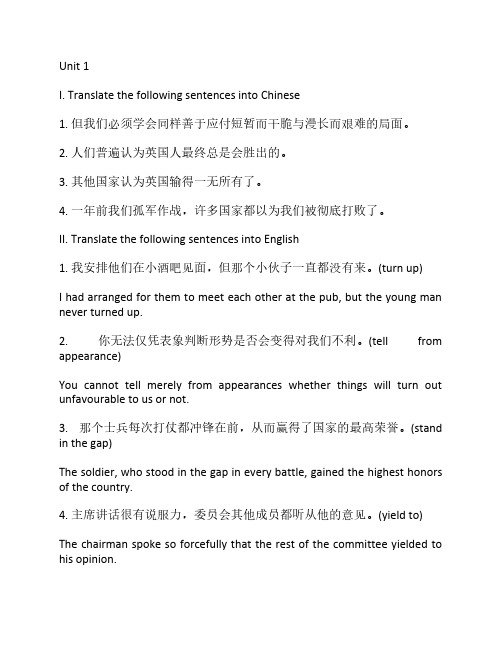
Unit 1I. Translate the following sentences into Chinese1. 但我们必须学会同样善于应付短暂而干脆与漫长而艰难的局面。
2. 人们普遍认为英国人最终总是会胜出的。
3. 其他国家认为英国输得一无所有了。
4. 一年前我们孤军作战,许多国家都以为我们被彻底打败了。
II. Translate the following sentences into English1. 我安排他们在小酒吧见面,但那个小伙子一直都没有来。
(turn up)I had arranged for them to meet each other at the pub, but the young man never turned up.2. 你无法仅凭表象判断形势是否会变得对我们不利。
(tell from appearance)You cannot tell merely from appearances whether things will turn out unfavourable to us or not.3. 那个士兵每次打仗都冲锋在前,从而赢得了国家的最高荣誉。
(stand in the gap)The soldier, who stood in the gap in every battle, gained the highest honors of the country.4. 主席讲话很有说服力,委员会其他成员都听从他的意见。
(yield to) The chairman spoke so forcefully that the rest of the committee yielded to his opinion.5. 他们现在生活富裕了,但也曾经历坎坷。
(ups and downs)They are well-to-do now, but along the way they had their ups and downs.6. 这次演讲我将说明两个问题。
- 1、下载文档前请自行甄别文档内容的完整性,平台不提供额外的编辑、内容补充、找答案等附加服务。
- 2、"仅部分预览"的文档,不可在线预览部分如存在完整性等问题,可反馈申请退款(可完整预览的文档不适用该条件!)。
- 3、如文档侵犯您的权益,请联系客服反馈,我们会尽快为您处理(人工客服工作时间:9:00-18:30)。
U n i t13M a r r i a g e课文翻译综合教程四-CAL-FENGHAI.-(YICAI)-Company One1Unit 13MarriageRobert Lynd1 “Conventional people,” says Mr. Bertrand Russell, “like to pretend thatdifficulties in regard to marriage are a new thing.” I could not help wondering, as I read this sentence, where one can meet these conventional people who think, or pretend to think, as conventional people do. I have known hundreds of conventional people, and I cannot remember one of them who thought the things conventional people seem to think. They were all, for example,convinced that marriage was a state beset with difficulties, and that thesedifficulties were as old, if not as the hills, at least as the day on which Adamlost a rib and gained a wife. A younger generation of conventional people has grown up in recent years, and it may be that they have a rosier conception of marriage than their ancestors; but the conventional people of the Victorianera were under no illusions on the subject. Their cynical attitude to marriage may be gathered from the enthusiastic reception they gave to Punch’s advice to those about to marry -“Don’t.”2 I doubt, indeed, whether the horrors of marriage were ever depicted morecruelly than during the conventional nineteenth century. The comic papersand music-halls made the m iseries a standing dish. “You can always tellwhether a man’s married or single from the way he’s dressed,” said thecomedian. “Look at the single man: no buttons on his shirt. Look at themarried man: no shirt.” The humour was crude; but it went home to t hehonest Victorian heart. If marriage were to be judged by the songsconventional people used to sing about it in the music-halls, it would seem a hell mainly populated by twins and leech-like mothers-in-law. The rareexperiences of Darby and Joan were, it is true, occasionally hymned, reducing strong men smelling strongly of alcohol to reverent silence; but, on the whole, the audience felt more normal when a comedian came out with an anti-marital refrain such as:O why did I leave my little back roomIn Bloomsbury,Where I could live on a pound a weekIn luxury(I forget the next line).But since I have married Maria,I’ve jumped out of the frying-panInto the blooming fire.3 No difficulties Why, the very nigger-minstrels of my boyhood used to open theirperformance with a chorus which began:Married! Married! O pity those who’re married.Those who go and take a wife must be very green.4 It is possible that the comedians exaggerated, and that Victorian wives werenot all viragos with pokers, who beat their tipsy husbands for staying out toolate. But at least they and their audiences refrained from painting marriage as an inevitable Paradise. Even the clergy would go no farther than to say thatmarriages were made in Heaven. That they did not believe that marriagenecessarily ended there is shown by the fact that one of them wrote a “best-seller” bearing the title How to Be Happy Though Married.5 I doubt, indeed, whether common opinion in any age has ever looked onmarriage as an untroubled Paradise. I consulted a dictionary of quotations on the subject and discovered that few of the opinions quoted were rose-coloured. These opinions, it may be objected, are the opinions ofunconventional people, but it is also true that they are opinions treasured and kept alive by conventional people. We have the reputed saying of thehenpecked Socrates, for example, when asked whether it was better to marry or not: “Whichever you do, you will repent.” We have Montaigne writing: “Ithappens as one sees in cages. The birds outside despair of ever getting in;those inside are equally desirous of getting out.” Bacon is no more prenuptial with his caustic quotation: “He was reputed one of the wise men that madeanswer to the question when a man s hould marry: ‘A young man not yet; anelder man not at all.’” Burton is far from encouraging! “One was never married, and that’s his hell; another is, and that’s his plague.” Pepys scribbled in hisdiary: “Strange to say what delight we married people have to see these poor folk decoyed into our condition.”6 The pious Jeremy Taylor was as keenly aware that marriage is not all bliss.“Marriage,” he declared, “hath in it less of beauty and more of safety than the single life - it hath more care but less danger; it is more merry and more sad;it is fuller of sorrows and fuller of joys.” The sentimental and optimistic Steelecan do no better than: “The marriage state, with and without the affectionsuitable to it, is the completest image of Heaven and Hell we are capable ofreceiving in this life.”7 Rousseau denied that a perfect marriage had ever been known. “I have oftenthought,” he wrote, “that if only one could prolong the joy of love in marriage we should have paradise on earth. That is a thing which has never beenhitherto.” Dr. Johnson is not quoted in the dictionary; but everyone willremember how, devoted husband though he was, he denied that the state of marriage was natural to man. “Sir,” he declared, “it is so far from being natural for a man and woman to live in a state of marriage that we find all the motives which they have for remaining in that connexion and the restraints whichcivilised society imposes to prevent separation are hardly sufficient to keepthem together."8 When one reads the things that have been said about marriage from onegeneration to another, one cannot but be amazed at the courage with which the young go on marrying. Almost everybody, conventional andunconventional, seems to have painted the troubles of marriage in the darkest colours. So pessimistic were the conventional novelists of the nineteenthcentury about marriage that they seldom dared to prolong their storiesbeyond the wedding bells. Married people in plays and novels are seldomenviable, and, as time goes on, they seem to get more and more miserable.Even conventional people nowadays enjoy the story of a thoroughly unhappy marriage. It is only fair to say, however, that in modern times we like toimagine that nearly everybody, single as well as married, is unhappy. As social reformers we are all for happiness, but as thinkers and aesthetes we are onthe side of misery.9 The truth is that we are a difficulty-conscious generation. Whether or not wemake life even more difficult than it would otherwise be by constantly talking about our difficulties I do not know. I sometimes suspect that half ourdifficulties are imaginary and that if we kept quiet about them they woulddisappear. Is it quite certain that the ostrich by burying his head in the sandnever escapes his pursuers I look forward to the day when a great naturalistwill discover that it is to this practice that the ostrich owes his survival.婚姻罗伯特·林德1 伯特兰·罗素先生说:“凡人百姓喜欢假装说婚姻中遇到的困难是新鲜事。
